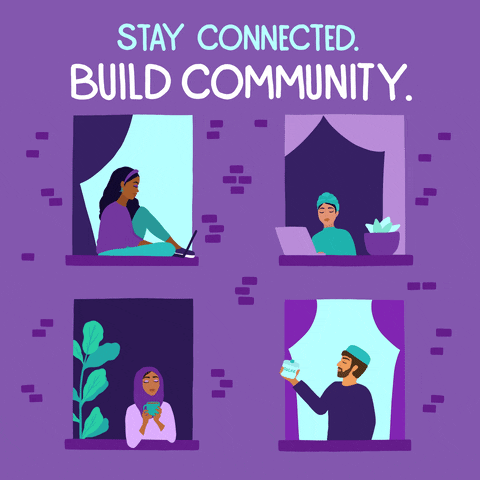Handling Holiday Stress as an LGBTQ+ Student

Why do Holidays Cause Stress?
Holidays are stressful for everyone— there’s pressure related to gift-giving, travel arrangements (during a pandemic, mind you!), financial stressors, unrealistic expectations, loneliness or grief, and challenging family dynamics.For many queer people, there’s a particularly stark convergence of these factors: they have to simultaneously deal with the economic and interpersonal difficulties related to the holidays, often with families that may not fully embrace their identity.
And, of course, there is the trepidation and guilt that comes with feeling like you’re the only person experiencing this stress when everyone else is enjoying the holidays (although we all experience some form of stress or pressure during the season!). In this guide, I’ll provide some tips that hopefully will be useful in making this holiday season more peaceful albeit the timely stressors.
1. Professional Advice
My first piece of advice is to get a professional evaluation if you’re able. There are many, many things we try to solve ourselves that are better addressed with a healthcare professional—both timewise and moneywise. If holiday stress is impacting your ability to function or becomes a pervasive thought, then it probably behooves you to talk with a provider.
There are more conditions, such as seasonal affective disorder, that may require treatment from a physician or therapist; otherwise, the holiday season may flare mental health issues that speak to a different condition that perhaps hasn’t been diagnosed yet. Knowing the accurate root cause of the holiday unease is the first and most important step towards healing, so I cannot stress this point enough. However, access is limited and cost/time prohibitive.
To learn about free mental health resources (including trans-specific care) please click here.
2. Boundaries
Boundaries are the imaginary lines we draw around us that determine how we want to be treated by others.
Being both mindful and deliberate about these lines is pivotal for those around us, but especially ourselves. First, ask yourself in advance of the holidays what matters to you the most, what you can negotiate, and what you can’t. Then, kindly and clearly communicate these boundaries (even in writing, if needed) to those around you.
However, you must also recognize this also means not forcing yourself to do anything you don’t want to do and respecting those wishes – this may look like scheduling a shorter stay in your family home, stepping out of a situation that makes you uncomfortable, or simply saying ‘no’ to traditions or gatherings that are exhausting. And when you do choose to correct others, consider validating their opinions first and then correcting them using I-statements (e.g., I totally understand where you’re coming from, but when you made that comment, I felt _____).
3. Learn to Let Go
The other half of boundary-setting is acknowledging all the things that are not your boundaries. These are circumstances you may want to learn to let go of, at least temporarily. We are all flawed and imperfect, and it’s likely that someone will say or do something upsetting to us, perhaps even with good intentions. Part of the process is honoring your emotions first and then deciding whether this is something worth the trouble (hint: those things outside your boundaries generally aren’t). And here is where you may wish to practice some forgiveness, accepting that people will make mistakes, and then choosing to put that away for your own wellbeing.
Bottom line: pick and choose your battles.
4. Set Realistic Expectations
Idealism can often interference with our holiday plans. We expect a beautiful, snow-covered winter wonderland. But life isn’t perfect. Going into the holidays with realistic expectations can help relieve some unnecessary pressure from your shoulders. Be it holiday overeating, excessive drinking, burdensome spending, or family fights, these are all common parts of the holidays for many. Be proactive and realistically plan for them in advance.
Practice some radical acceptance and then look for small steps to help offset any downsides, if at all possible. For example, give yourself the space to eat to satiety, knowing you’ll use that energy for an energizing walk the next day. Or, if you plan to have a difficult conversation with family, plan to schedule some time to have fun with them too.
And lastly, remember the larger picture with some self-compassion: it’s okay if things don’t go as planned, the holidays are short, and hey, you have a whole new year to address any of these potential shortcomings.
5. Keep your Habits
Humans have a tendency to give up their good, supportive habits when undergoing stressful situations. During this season, it’s important to keep doing all the things that bring us happiness year-round even when you don’t necessarily feel motivated to continue.
Keep exercising, even if you’re not in your hometown. Keep calling your friends, even if you’re surrounded by family members. Keep spending time alone, even when you feel depleted of time. If you’re stressed about gift-giving, use your same work habits to address the issue: to-do lists, brain dumps, calendars, or whatever it takes.
Don’t feel like you have to fundamentally change what you do for the holidays, as much as you should focus on being consistent in doing those things that have worked for you in the past: meditation, journaling, self-care days, gratitude, sleep hygiene, etc. And if you haven’t yet found a good coping skill, try any of the ones I just listed and use these holidays as an opportunity to learn more about yourself!
For resources, talk-lines, and other support for LGBTQ+ folks near you, search this map of LGBTQ+ resources from Models of Pride.

This post was written by Point Alum Manuel Faria (he/him).
Read more about the Point Flagship Scholarship for LGBTQ+ students program here.
Related Posts
December 02, 2021, Hope Harris

Meet Point Flagship Scholar Sofia
The Point Flagship scholarship for LGBTQ+ students and allies provides financial assistance,...
August 23, 2021, Hope Harris

6 Ways to Have the Best Fall Semester, According to LGBTQ+ Students
Heading back to school? 2021 Point Scholars Michael, Jennifer, Andreas, Alexzander, and Nicholas...
January 22, 2022, Hope Harris

Meet Point Flagship Scholar Davy
The Point Flagship scholarship for LGBTQ+ students and allies provides financial assistance,...